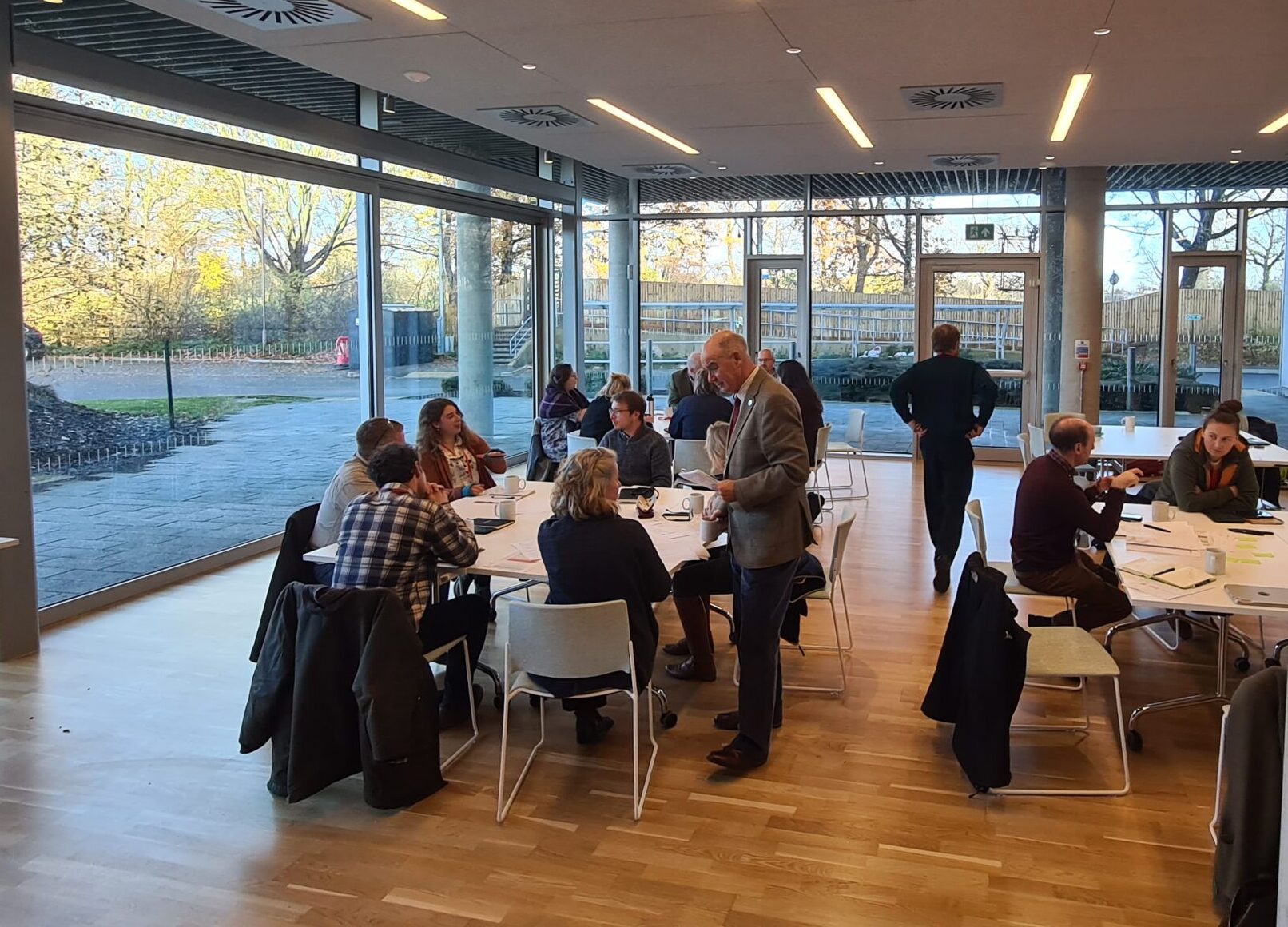Oper8 aims at enhancing the uptake of alternative weed control solutions. A first phase of understanding the barriers, gaps, and needs for a broad adoption of alternative weed control has been carried out in the first year of the project. Inputs of stakeholders from all Oper8 partner countries have been taken into consideration. Different kinds of solutions have been inventoried for various crop sectors, to assess them, based on technical, socio-economic, and environmental criteria.
From October 2023, a first round of assessment, both at European and National scales, allows gathering information about the technical feasibility, benefits, and drawbacks of these inventoried solutions, regarding efficiency, operationality, costs of implementation, impact on biodiversity, soil fertility, among other indicators. Through participative workshops, farmers, researchers, advisors, industry representatives and other stakeholders are asked to take part in this assessment, providing us with their experience, knowledge, and feedback about alternative weed control solutions.
Below are summaries of the first round of National workshops, being held in each Oper8 partner countries: France, Spain, UK, Latvia, Italy, Sweden, and Greece.
The most promising solutions will be promoted through technical videos, fact sheets, demonstration events, practice abstracts, and an e-learning module. Additionally, some of these solutions will undergo a thorough Cost-Benefit Analysis.
FRANCE
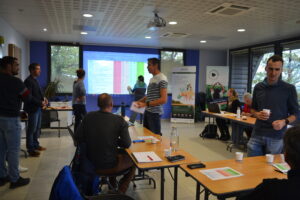
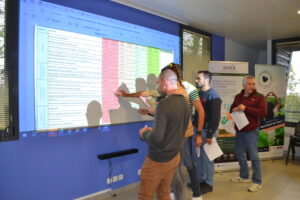
The French workshop focused on alternative weed control for vineyards. It was held in person on Friday 24 November 2023, at IFV Peyrole (French Wine and Vine Institute) in southwestern France, between Albi and Toulouse. In the morning, stakeholders from agricultural companies, advisors from Chambers of Agriculture and cooperatives, farmers involved in weed control trials, winegrowing sector experts and engineers, have been working together and sharing their experiences to assess several weeding solutions. In the afternoon, a demo-event was held to provide the participants with results of IFV trials about Electrical weeding and different kinds of dead mulches. During the workshop, biological control, cover crops, dead mulching, electrical weeding, and mechanical weeding solutions have been assessed. Electrical weeding was among the most innovative solution, and many workshop participants did not get the chance to test it yet. Along discussions between experts and other practitioners, some solutions appeared to have unanimous assessment, while for some others, people did not agree, due to a lack of information, or unequal opinion on some criteria, such as costs, impact on crops, or operational limits. This French workshop allowed seeing which solutions are more acceptable, which ones are less known, and what are the main drawbacks preventing their uptake. Three solutions, all focusing on the row area, have been selected to undergo a Cost-Benefit Analysis: mechanical weeding, being the most widespread solution after herbicide use, sowed under-row cover crops, and dead mulches.
UK
The National Workshop for the UK was held on 28 November 2023 as an In-person meeting at the British Sugar headquarters in Peterborough hosted by ADAS and ORC jointly. The event was attended by twenty people and was a mix of farmers, agronomists, industry representatives and researchers.
The day was chaired by one of the UK National Experts, James Clarke. The workshop started with a presentation by Lynn Tatnell introducing the Oper8 project and providing a summary of the Oper8 survey results and National Action Plan (NAP) for the UK. The group of participants then split into three groups, two covering arable crops and one group covering ‘field vegetables and wide row crops’. Ten solutions were evaluated in the arable crops and 12 solutions in the ‘field vegetables and wide row’ crops. Cultural controls came out on top for both crop types, with all participants agreeing that this is fundamental to good weed control. Within the working group about field vegetable and wide row crops there were lively discussions about the need for farmers and growers to change their mindset when it comes to tackling weeds with herbicides. It was noted that if government or business incentives were put in place to reduce herbicide applications, this would support farmers to transition to new solutions and go some way to de-risk this type of decision making on farms.
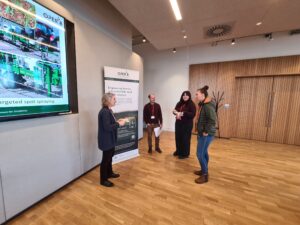
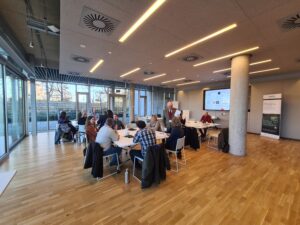
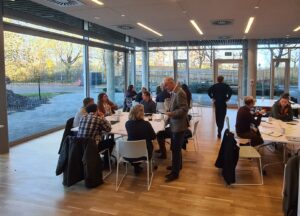
Latvia
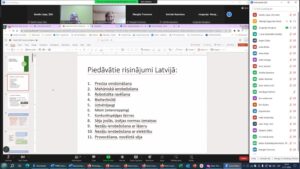 In Latvia we had the workshop with 20 National Network members representing: farmers, consultants, policy makers, scientists, Latvian Organic farming association on 27th of November. We were discussing online about 20 potential solutions, which would help to reduce the usage of chemical pesticides in small grain growing technological scheme. OPER8 representatives made the presentation of possible solution, making an introduction and pointing out to some potential drawbacks and benefits of alternative technologies. During the long discussion, NN made a conclusion, that the best way to lower the herbicide usage is to use multiple methods simultaneously. Evaluation of one separate method is a quite difficult task, because very often one method complement other. It is clear, that some bioherbicides will not come to Latvian pesticide market on very soon, therefore there is a need to look for some new technologies. Most farmers are ready to use some mechanical treatment equipment and precise sprayers at the moment and they see the higher potential for that technologies, without losing the yield and profits very much. If we speak about new wheat cultivars competitive to weeds, than information can be found quite limited and some market ready solutions are not available.
In Latvia we had the workshop with 20 National Network members representing: farmers, consultants, policy makers, scientists, Latvian Organic farming association on 27th of November. We were discussing online about 20 potential solutions, which would help to reduce the usage of chemical pesticides in small grain growing technological scheme. OPER8 representatives made the presentation of possible solution, making an introduction and pointing out to some potential drawbacks and benefits of alternative technologies. During the long discussion, NN made a conclusion, that the best way to lower the herbicide usage is to use multiple methods simultaneously. Evaluation of one separate method is a quite difficult task, because very often one method complement other. It is clear, that some bioherbicides will not come to Latvian pesticide market on very soon, therefore there is a need to look for some new technologies. Most farmers are ready to use some mechanical treatment equipment and precise sprayers at the moment and they see the higher potential for that technologies, without losing the yield and profits very much. If we speak about new wheat cultivars competitive to weeds, than information can be found quite limited and some market ready solutions are not available.
Robotized mechanical weeding and spraying is also promising, but there are some legislation limits and market offer is not so broad as well.
After making explanation work and getting some clarifying question from experts, so that rules are clear to all the participants, the online survey was made.
Italy
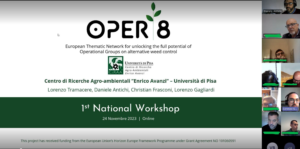
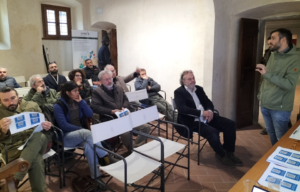
The Italian workshop (WS) was split in two distinct WSs, one held online on November 24th, focusing on arable and field vegetable crops, and one for vineyards held in person on December 1st, in the Chianti area at San Donato in Poggio in the province of Florence, Tuscany. Both WSs were planned in the same way and lasted from 10 AM to 5 PM. Farmers, advisors, industry representatives (farm machinery companies, seed companies), researchers, and officers of regional/governmental public authorities have been asked to share their expertise evaluating the proposed weeding solutions.
In the first part of the WSs, after a quick self-introduction of the participants, the NNO Lorenzo Tramacere introduced the Oper8 project and summarized the technical solutions to be assessed, that were pre-selected by UNIPI based on the results of the Oper8 survey and the preliminary selection made for the National Action Plan (NAP) for Italy. 17 solutions were evaluated during the WS relative to arable and field vegetables, while 12 in that for vineyards. Then, Lorenzo explained to the attendees how to fill the form prepared to assess the solutions and the individual assessment started.
In the afternoon, Daniele presented the preliminary ranking of the solutions based on the answers of the stakeholders, and together with the attendees we started a debate. After the discussion, in some cases, solutions that received a low score were shifted in a best position based on the agreement of all participants. Concerning the arable and field vegetables, the best solution resulted the crop rotation, while for vineyards the high score was achieved by the inter-row dead mulch, although all attendees were agreeing that the worst problem in vineyard is the under-row management.
Greece
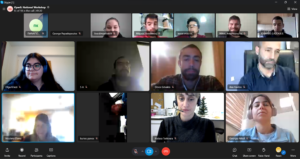

The first Greek National Workshop, held on November 20th, 2023, marked a significant milestone in agricultural collaboration. Facilitated through an online platform, the event drew participants from diverse backgrounds, including farmers, researchers, and industry professionals, uniting stakeholders from across Greece. The primary objective of this workshop was to assess a spectrum of alternative weed control solutions outlined in the Greek National Action Plan.
A comprehensive evaluation unfolded, encompassing 18 distinct solutions. These included innovative approaches such as camera-guided mechanical weeding, cover crops, variety selections, bioherbicides, hot foam, crop rotation, false seedbed, precision spraying, and mixed systems. The scope of application extended to outdoor horticultural crops, vineyards, orchards, and cereals.
Our team presented each solution, providing essential information and practical examples to enlighten the participating stakeholders. The gathering served as a collaborative platform where farmers, researchers, and industry experts engaged in lively discussions, sharing their perspectives, knowledge, and expertise on the presented solutions.
Post-discussion, a systematic evaluation ensued. Each solution underwent scrutiny based on a set of carefully selected criteria, including efficiency, operationality, socio-economic costs, and environmental impact. Stakeholders actively contributed their insights, fostering a collective effort to identify optimal weed control solutions for diverse agricultural contexts.
Sweden
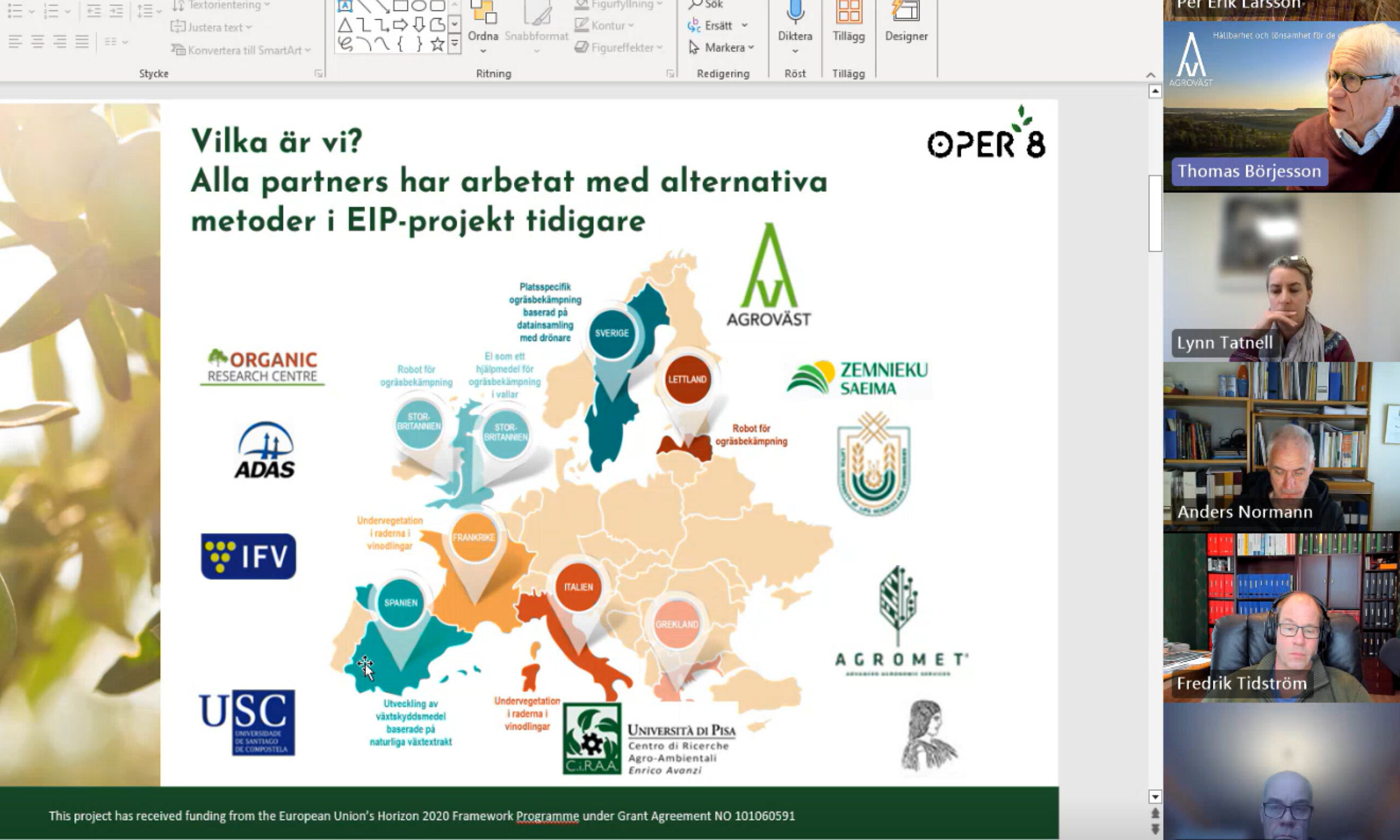
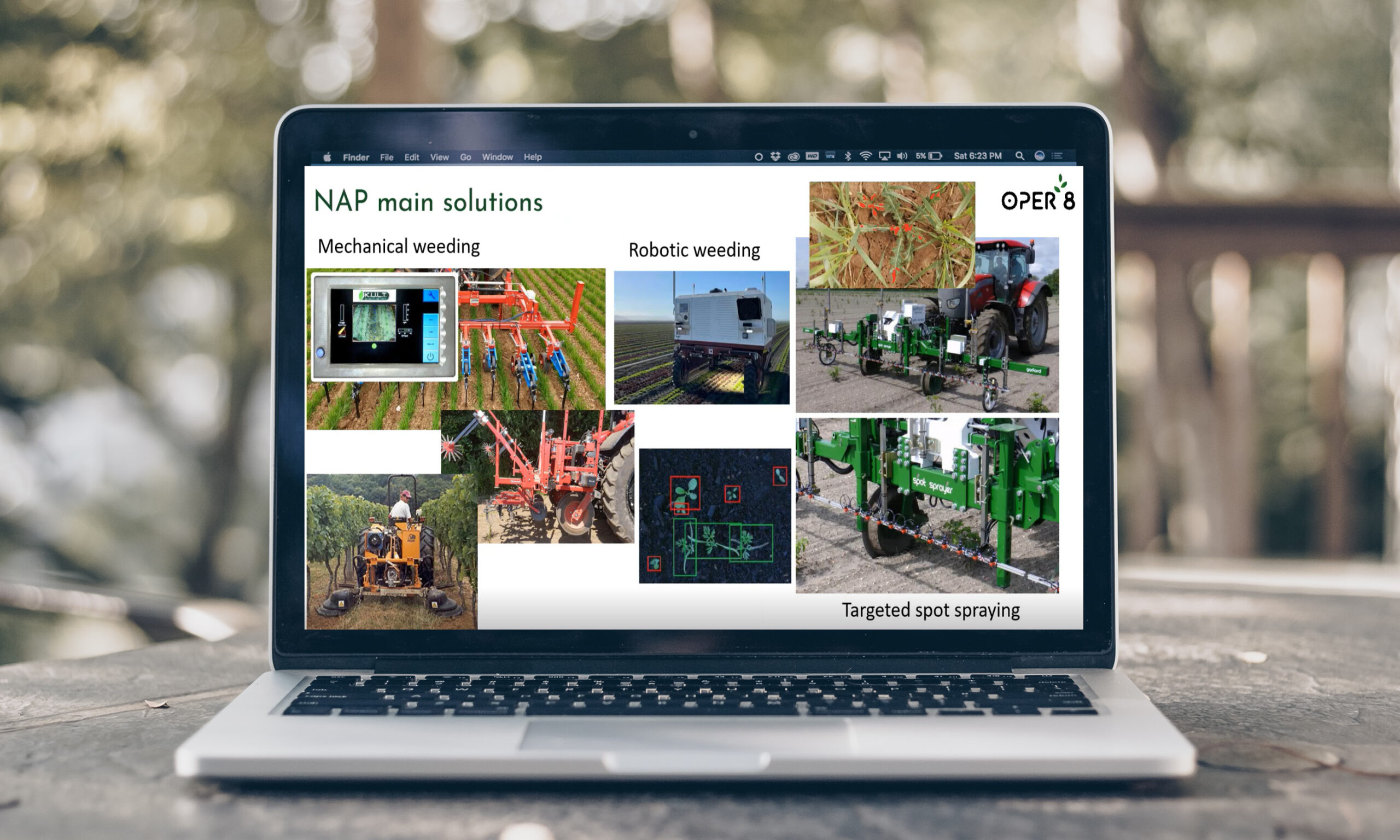
Fifteen weed experts, mainly advisors for the Swedish National Workshop which was held as a webinar on the 15th of December 2023
The meeting started with a quick introduction of the project by Thomas Börjesson and then Lynn Tatnell, ADAS, summarized the Survey with special emphasis on the surveys performed in Sweden and UK. It was obvious was that the Integrated Weed Management is followed to a larger extent in Sweden than in the other countries taking part in the project. Lynn also emphasized that there are similarities between the British and the Swedish answers in that arable crops dominate and that camera guided hoes and robots belong to the techniques that the respondents see as interesting techniques to use in the future.
Fanny Prezman continued and presented some examples from the discussion in the French Workshop where the use of electrical weeding technologies as well as mulch and subcrops under the vine plants are considered as interesting techniques to evaluate further. After this introduction, Lynn and Fanny left and the Workshop continued in Swedish. Thomas Börjesson started with a presentation of the results from the forms that have already been filled in: They covered either arable crops or field grown vegetables. In the case of arable crops, the agronomical tools had clearly received the highest scores followed by mechanical weeding technologies and camera guide hoes. Technologies involving cameras om spraying booms or the use of data collection and the possibility to spray directly using drones, had not received lower scores. The reason is that these techniques are not fully available on the market and that the cost is considered to be high. Robots had not received so high scores either. For field grown vegetables, the results were similar, but the robots had received a little bit higher scores. The reason is probably that the demands and the revenues per hectar are higher for the vegetables.
Since agronomical tools are considered interesting, it may be of interest to look more into which of these methods are the most promising to develop further. The discussion also focused on how to judge the different techniques that are not out on the market yet. It is however obvious, not the least from what was presented on this year´s Agritechnica, that several new technologies are on their way to the market. An example is camera guided hoes and drone applications.
The forms were in general considered a little too complicated and one advise was that a simplified form could make more farmers and advisors fill it in. It could be simplified by only asking the respondents which techniques they consider as interesting for the future. It was also emphasized again, that it must be made attractive financially to choose a more environmentally friendly technique.
As a whole we had a valuable discussion and many of the attendees pointed out that the discussion is more valuable than filling in the forms, so this opens up for further contacts within the group.
Spain
![1st Spanish National Workshop_summary[94]](https://www.oper-8.eu/wp-content/uploads/2024/01/1st-Spanish-National-Workshop_summary94.png)
The 1st Spanish National Workshop, held online on December 15, 2023, brought together 22 participants, including farmers, advisors, industry representatives, and researchers. The workshop was part of the methodology part of the Oper8 project, aimed at evaluating and prioritizing sustainable solutions for alternative weeding methods.
The meeting was facilitated by the Spanish National Network Operators Francisco Javier Rodríguez Rigueiro and María Rosa Mosquera Losada, supported by experts such as Vanessa Álvarez López, Nuria Ferreiro Domínguez, Antonio Rigueiro Rodríguez and Julián García Berrios, who focused on presenting the solutions and moderating breakout rooms. The workshop addressed vineyards, arable, and horticultural crops, aligning with the Spanish National Action Plan (NAP) drafted within the Oper8. A total of 20 potential solutions, each applicable to two or three crops, were addressed during the workshop. To streamline the process, 20 Excel sheets and an additional 20 tables for comments were generated for criteria assessment.
In breakout group sessions, participants evaluated the solutions based on the Excel sheets. Back in the main meeting room, group representatives explained the results of the evaluation, and participants added some extra clarifications. As a result, 12 solutions were selected by the workshop participants.
The potential solutions were analysed compared to a reference system as traditional management in the average farm of the region of Galicia (NW Spain), the region of precedence for most of the farmers and advisors participating in the meeting.
For arable crops, the top four selected methods were variety selection, bioherbicides, cultural control (cover crops), and mechanical weeding. In the case of horticultural crops, the selected solutions included agroforestry methods, cultural control (cover crops), mulching, and bioherbicides. For viticultural crops, the top solutions were targeted herbicides, agroforestry methods, mulching, and cultural control – cover crops.
From the 12 best practice solutions, three were selected for a detailed cost-benefit analysis. These include “Cultural control – Cover crops” for arable crops, “Mulching with wood chips and herbs” for horticultural crops, and “Agroforestry methods” for viticultural crops. This analysis will provide further insights into the economic viability of these alternative weeding methods.


